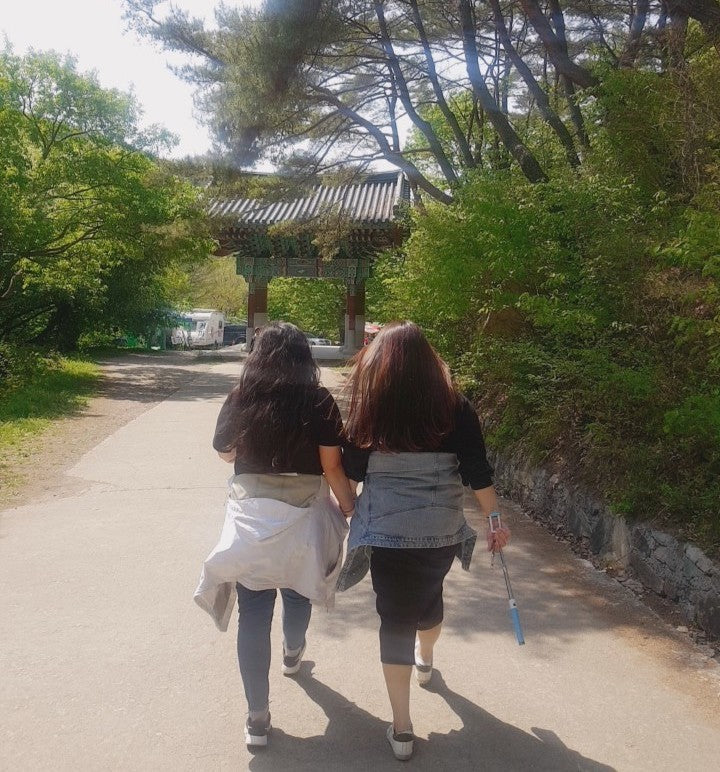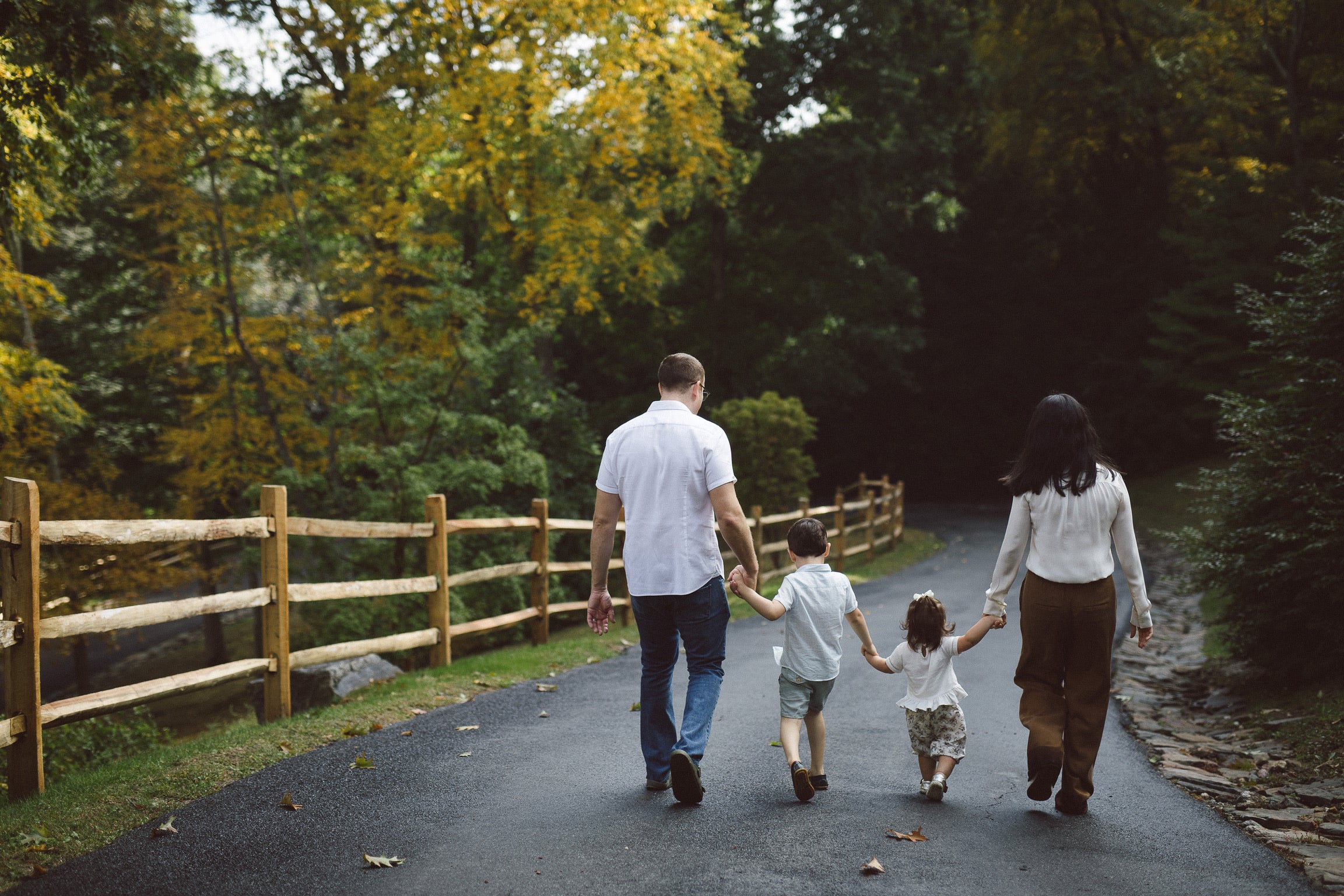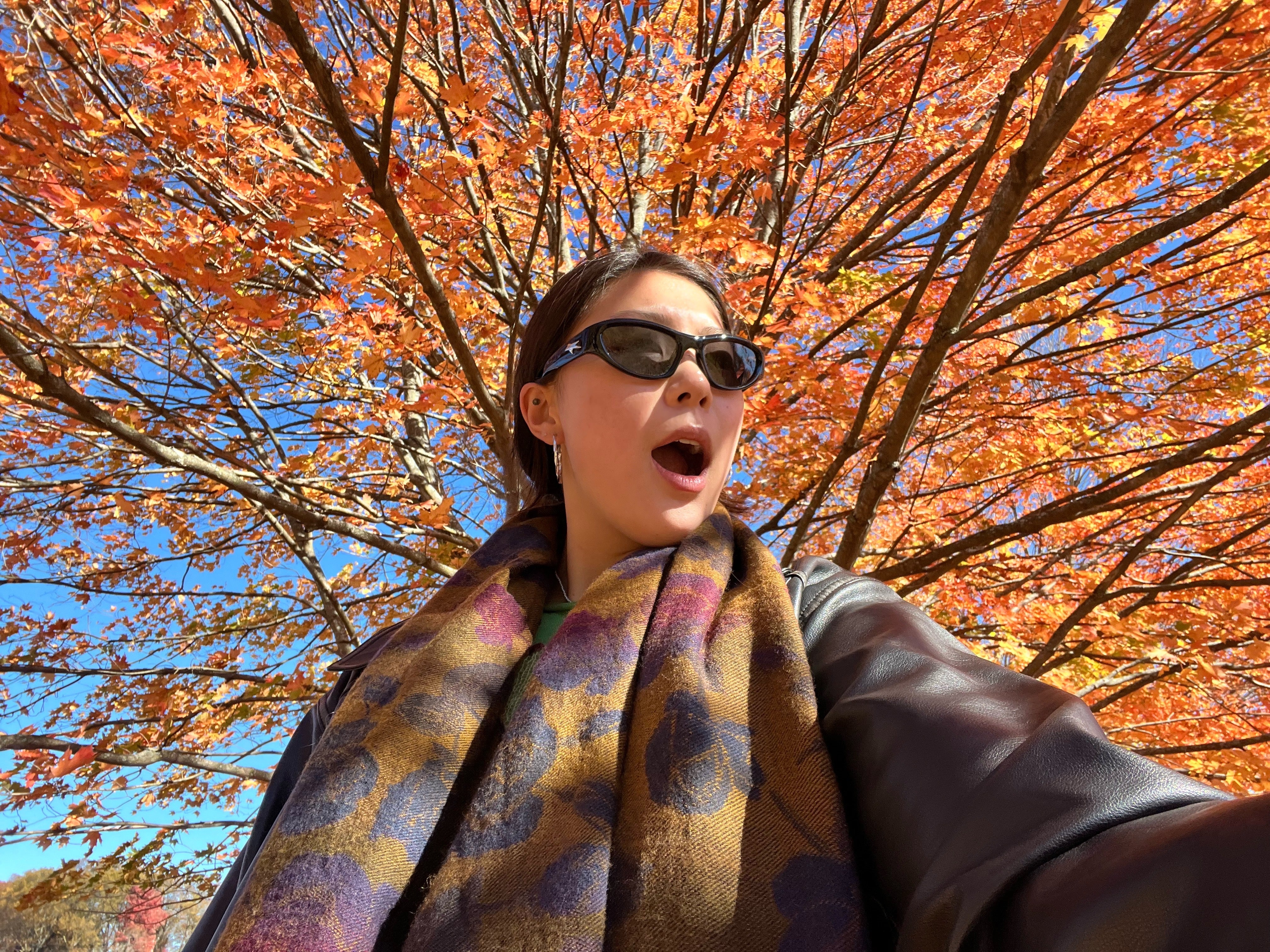May is Asian American and Pacific Islander Heritage Month and we want to celebrate this important time of year. As a woman-owned, women-run AAPI company we are always looking for unique and diverse stories to share with our Knours Kommunity. This week we have invited Laura-Ann (LA) Jacobs to speak to us about growing up as one of the few Asian-Americans in her community, how she grew to understand and appreciate her Korean heritage, and what led her to a unique path in the vast realm of education.

LA with her partner Tyler when they got engaged in October 2019
Before we dive in, here’s some background on today’s guest! LA is a proud Korean-American adoptee with an extensive background in education: she is a former high school English teacher, a recent PhD graduate, and a current postdoc research fellow at the University of Michigan. She is also a staff member of two Korean cultural camps (Sejong Camp and Camp Naru), that teach young Korean-Americans and Korean-American adoptees about their Korean culture and provide them with a space to embrace their heritage and create a community with a diverse group of individuals. In her free time she enjoys cooking (and of course eating!), singing at 노래방 (karaoke), and traveling to places with beautiful landscapes and hikes. She also enjoys playing video games and hosting ever-exciting murder mystery parties. Keep reading to learn more about LA’s journey.
1. Could you tell us about your adoption story and where you grew up? Have you always considered yourself to be Korean-American?
I identify as a Korean-American adoptee. I was born in Korea as the youngest of nine children and relinquished on the day I was born. I was adopted to the United States when I was 4 months old and grew up outside of Atlanta, Georgia. My parents are white, and I grew up with one older brother who is also a Korean American adoptee. Yes, I would say that being an adoptee has shaped my identity as a Korean-American, which is strange because I have not always been proud to be Korean-American. While I had some Asian-American and Korean-American friends, I grew up in a predominantly white community and spent most of my time aware that I was different from most of the people in my school, my community, and my family. For much of my growing up, I tried in some ways to minimize being different by finding ways to belong socially, academically, or extracurricularly; I hoped that my achievements might stand out more than my appearance. In my adulthood, I slowed down more and tried to focus on things that I enjoyed rather than things that earned prestige or accolades. I tried to be aware of when I was doing something that was not for myself, the things that I was only doing so that I could feel that I belonged. And when I started to strip away all of these things that were not me–all the things that were covering up my difference–I started to see more of myself and started to learn more about myself and my identity as a Korean-American adoptee. When I was younger I would say “I’m Korean” only when someone asked, but now I am very proud to be Korean-American and very proud also to be an adoptee. I think that this journey is different for everyone. I would say that I am still learning about who I am and who I want to become.
2. How have you explored your Korean culture?
I visited Korea in 2019 to meet my birth family for the first time since I was born. Adoptees call this a “reunion trip.” As I prepared for my reunion trip, one thing that I tried to do every day was to learn more about Korean culture: I tried to learn Korean language, I watched KDramas, I started using Korean skin care products, I went to Korean grocery stores, I ate at Korean restaurants. I knew that visiting Korea would be an immersive and emotionally demanding experience, and I wanted to try to prepare myself in small ways so that I might not be so overwhelmed once I arrived. My favorite way to learn about Korean culture is through food [since] I enjoy cooking and eating. Food is fully sensory; I hear the sizzling, I see the colors, I feel the textures, I smell the aroma, I taste the flavors. Cooking and eating are a kind of immersive experience for me because I feel that my whole mind and body are present in an awareness of learning. This was the time in my life when I started learning the most about Korean food. I tried dishes that were new to me at restaurants, read numerous Korean recipe blogs, watched so many videos on YouTube, and tried to learn how to make Korean food a part of my everyday life. While learning about Korean culture was at first a very focused and deliberate (and exciting) effort, I have found that “being Korean” has become something much more comfortable for me, and many things have become a part of my daily routine.

LA with her sixth oldest birth sister during her reunion trip to Korea in 2019
3. Have you been able to connect with other adoptees?
[Yes, and I believe that] connecting with other adoptees has been a very powerful experience for me [and it has also] become something very important to me. [Being able to] shar[e] our past experience with each other, understand each other, and learn about Korean culture together energizes me, affirms me, and sustains me. I have met many other adoptees through community networks, conferences, and organizations. I also volunteer to support two Korean culture camps for children and youth in the summer. This work is very important and very powerful to me. When I think about my own experience growing up, I had very few Korean friends and felt that I was learning about Korean culture on my own. I also did not know Korean adults and so [I] had difficulty imagining a future for myself because I never had a role model who looked like me or a mentor who shared some of my experiences as [either] a Korean-American or as an adoptee. For me, exploring Korean culture and Korean-American identity means being in community with other Korean people. As an adult, I have the experience of working with Korean-American children and youth as they are learning about themselves, connecting with other Korean-American adoptees as we learn about ourselves, and being in conversation with older Korean-Americans who share how they have navigated their own experiences and who mentor me. I have found this intergenerational work to be really central to my own sense of who I am and who I would like to become, and I encourage all Korean-Americans who are learning about themselves to do this work by being in community with others.

LA with her friend Emily and her dog Alkong. Emily and LA met and connected through Korean American adoptee networks and have become very close friends.
4. What does being Korean-American mean to you?
As I meet more Korean-Americans from different backgrounds and learn about their experiences, my understanding of what it means to be Korean-American continues to change and expand. To me, being Korean-American means that I am both Korean and American and that these two places, cultures, and histories shape me and influence me together and not separately. Although some people have wanted to categorize me as more Korean or more American at different times depending on the context, I know that I am both entirely Korean and entirely American at the same time all the time. Rather than trying to fit into and move back-and-forth between these two categories, I have become more comfortable knowing that the space in between is a space of its own. [Being] Korean-American [also] means that I have choice and agency in living not between worlds but rather within two worlds at the same time. I think that as a Korean-American, I have an opportunity to decide what strengths and aspects of each culture inform my thinking, my worldview, and my everyday life, and I feel very empowered by this idea of being and becoming Korean-American in community with others.

LA and Tyler at an SK Wyverns baseball game in Korea 2019
5. Have there been times when you faced prejudice or felt like you didn’t belong because of your race?
Fortunately I have not had many moments where I have faced prejudice or been the direct target of racism. Although the moments are few, they do still loom in my memory. I grew up with many friends, and these friendships were more about who we were than how we looked or where we were from. Sometimes, though, I was aware of differences. I remember going to sleepovers or getting ready for school dances and not having anyone who could teach me how to wear make-up or do my hair. I guess these things are all superficial, but they were things that I thought would make me feel more beautiful at the time. At some point as a young adult, I learned how to do these things and [I] did them for many years. [Then, one day] I decided that all this work was just another way that I was trying to belong [so] I stopped doing it all. I [instead] wanted to try being more natural and more comfortable with my face, my skin, and my hair. I learned about Korean skincare and haircare products and slowly observed how my body responded. I still often find myself as the one of the few Asian faces in a crowd, but I am feeling more comfortable knowing that my sense of belonging is to myself and not to others.
6. Can you tell us about the kind of work you do and what led you to this path?
I recently completed a PhD in Education with a specialization in antiracist teacher education, which means that I focus on training future teachers (student teachers) to teach in anti-oppressive ways. I focus on teaching future teachers how to design curriculum, engage in instructional practice, and build relationships and community in their classrooms that are responsive to their students’ needs and interests and that consider the complexities of history and current society. I chose to focus on teacher education because I am a former teacher-I taught public high school English in South Carolina for 6 years-[and] I feel that being a teacher is one of my strongest identities. I decided to try graduate school because I was dissatisfied with and curious about why students have such vastly different experiences in school. I came to understand that this can be called “educational inequity.” I wondered what could be done in individual classrooms to support students in having positive learning experiences, and I decided that focusing on how teachers design their curriculum, make instructional choices, and build community in the classroom was a starting point.

LA at the University of Michigan Commencement 2022. "I graduated with a PhD in Educational Studies: Literacy, Language, and Culture. The title of my dissertation is “‘Telling Another Kind of Story’: Embracing Tensions in Preparing Secondary English Language Arts Teachers for Antiracist Pedagogical Change at the Personal, Instructional, and Curricular Levels”."
7. How do you hope to change the education system through this new kind of teaching and research? What do you hope teachers will be able to gain from this teaching method?
I was a very high-achieving student. And I have always loved learning. Even though I have been very conventionally successful in school, there are moments when I felt that I had to silence parts of myself to meet a goal. Having worked with hundreds of students–as a public school teacher, a community center volunteer, a summer camp staff member–I feel that I am not alone in my experience of having felt invisibilized sometimes in school. To me, the purpose of education is to learn about the past, to learn about ourselves, and to learn about our world so that we can imagine many possible futures. Teachers have a tremendous responsibility not only to prepare students to enter the world but also to empower students to contribute to the world. To me, antiracist teaching and research is about centering students and their learning and teaching in a way that is responsive to them and supports them in making these connections to the past and the present so that they can have an impact on the everchanging future. If we only teach traditional knowledge in traditional ways, we are excluding the knowledge, experiences, and contributions of many of the students in our classrooms, and we are not preparing our society for a better world. Antiracist teaching is about creating invitations and opportunities that are inclusive, equitable, responsive, and just and that consider the diverse backgrounds and experiences of all students. This work is difficult and demanding [and] I hope to show teachers that antiracist teaching is truly transformative. In my experience, teachers who take antiracist stances in what they teach, how they teach, and how they build relationships and classroom community empower their students with a sense of belonging, engage their students in rigorous learning, and equip students with skills and knowledge that they can apply to whatever future they imagine for themselves.
8. How do you hope AAPI youth now will view their culture and their identities as Asian-Americans?
I hope that all youth, but especially youth of color and especially AAPI youth, see that who they are and where they come from is important and that the things that they are doing and the things that they pursue will make significant contributions to our shared futures. I have the experience of having tried to hide or erase parts of my identity or culture because I felt that I needed to do that in order to belong. Now that I have more experience embracing and learning about my identity and cultural background, I am more comfortable with who I am and more confident in all areas of my life. I am more certain that my perspective and contribution matters because I know where I come from and who I am, and I have a stronger sense of my own worth. Every person is unique–with their own beauty and their own brilliance, their own skills and insights. I hope that Asian-American youth see that they can be their whole selves and bring their whole histories and whole hopes for the future into their dreams and that doing so can also bring them happiness and success in many ways.

LA with Ben Oser, Doug Kim, and Paige Bly–members of the leadership team for Camp Naru, a Korean culture camp in New York. Ben and Paige are also adoptees from Korea.
9. What is one piece of advice you would give to your younger self in terms of navigating your identity?
[I would tell younger myself] to take more time to pause to learn about myself so that I could learn to love myself earlier. There are many things that I had always wished were different about me–whether it was the shape of my face, the thickness of my arms, the loudness of my laugh, the unreasonableness of my stubbornness, or the impulsiveness of my impatience. I would [also] tell myself to look at myself more, to appreciate the smallness of my nose or the way my lips chap in the softest breeze. The traits that are my insecurities come from somewhere, from someone else, and I have to learn to carry that physical legacy with me. I would tell myself not to be embarrassed by my excitement or loud laughter because finding joy in small moments should never be a source of shame. And [lastly] I would tell myself that stubbornness and impatience are not alone negative qualities, but that knowing when to be stubborn and when to be impatient can be virtues. I would wish for my younger self to know myself better so that I could embrace the things that made me insecure and so that I could sit more comfortably with myself in peace.
10. Is there anything else you would like to share?
Thank you for the invitation to share about myself and some of my journey on the Knours blog! You can learn more about me on my website (www.lxjacobs.com) or by following me on Instagram (@laxjacobs).





Leave a comment
All comments are moderated before being published.
This site is protected by hCaptcha and the hCaptcha Privacy Policy and Terms of Service apply.